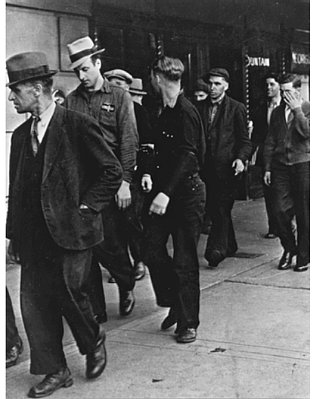
|
Following the 1929 stock market crash came a period called “The Dirty Thirties”. It was a time of massive unemployment. Canadians rode the rods (freight trains) wherever they could, on top and under the box cars, looking for work. These transients lived beside the railways usually near a town. Others lived as unemployed do today on the streets. They were badly treated by the authorities and state machinery. This period coincided with a severe drought so many farmers moved with their families to the city looking for employment. There simply was none and they joined the ranks of those on relief as soon as they could yes there were waiting periods then as there are today. Governments set up a system of relief, now called social assistance. Those on relief received chits (a note or requisition for a sum of money) these were given to cover rent others to cover food and still others for fuel. This practice forced recipients to buy in stores that would accept such chits. There were many complaints of being cheated and shamed. Relief offices sprang up across Canada in cities and small towns. Their employees’ attitude to relief recipients was they were lazy, didn’t want to work and were a drain on society. Sadly this reflected much general public belief fostered by media. The many thousand of redundant workers layed-off and jobless in today’s world will know well how they were treated.
Many workers, particularly those who had been in unions, some who were communists, began to organize these mistreated citizens. They put up a strong fight for cash relief and eventually won. It was in 1935 one of the most important events in Canadian history took place. As we noted earlier the dirty thirties and the mass of unemployed became the focus of working class organizing with the Communist Party and the new socialist party the C-operative Commonwealth Federation playing a role. Starting in Vancouver under Slim Evans three divisions of unemployed left for Ottawa to demand action for jobs by the Bennet conservative government became the “On To Ottawa Trek” (that name will provide readers with internet capabilities with resource material. Those who wish can also find material in public libraries. A video on the trek is available from working TV.com.
This trek ended with the “Regina Riot”. I was only a student in public school at the time but the memory is vivid. There are also references on this as quoted above. This personal recount may be of interest to readers. There can be no question that it was on Bennet government orders the strike was stopped in Regina. In Regina the trekkers had arranged for a public meeting in ‘Market Square’ The police both RCMP and City were hidden from the square. The organizers of the meeting were under orders to not appeal for funds I was told. When someone from the crowd called for donations the hidden police charged out of vans and the police station and attacked the crowd on horseback and on foot. They used their weapons on the crowd indiscriminately. My mother and aunt had taken me to the Dark Hall for a recital in the Dark Hall. On the way home in a street car as we passed the police station we heard a sound that will never be forgotten. It was to roar of an angry crowd, of people outraged and fighting mad!
The battle with the police spread all over down town Regina. The Mounties on horseback swung their clubs at anyone who came within their range. I remember Josephine Gehl telling me she had to seek refuge in a doorway of a store when a mounted policeman tried to club her. She said she was so angry she went to the Communist Party office and joined. The trek was halted in Regina and the federal government allowed a delegation to go to Ottawa. Bennet listened but did not act on their just demands. At the next election they were defeated.
During the 1930’s fascism gained power in Germany. Almost every capitalist country had fascist movements. In 1936 the people of Spain elected a social democratic government. Fascist General Franco led a revolt against this democratically elected government. What began as a civil war changed character as countries like Britain, France, Canada and the United States of America decided on a policy of non-intervention and isolation. It in reality became a blockade. There have been several books written which should be available in libraries and possibly could be found listed on the internet. William (Bill) Beeching a veteran of the Spanish Civil War wrote a book that the remaining members of the MacKenzie-Papineau Battalion asked him to write. It is available in some libraries and from Canadian Plains Research University of Regina. This recount though sketchy will no doubt be expanded on and other stories added in future. |

 Stories from the past -The 1930’s
Stories from the past -The 1930’s